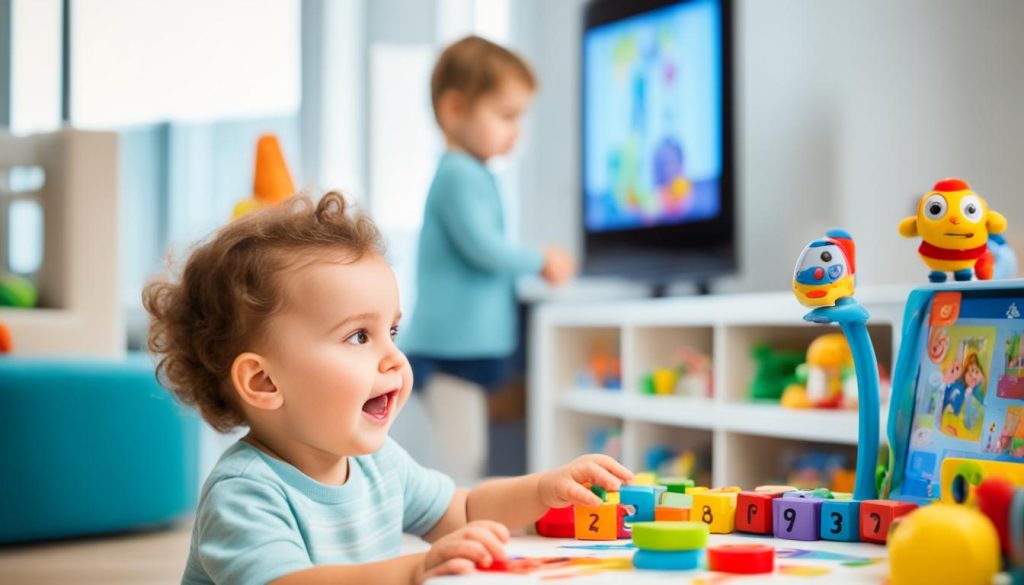Do you remember when your child first showed interest in something new? Maybe it was their dancing to music or painting with creativity. This spark of passion is special for both of you. As you guide your child through parenting and raising kids, supporting their interests boosts their self-esteem, independence, and happiness.
Helping your child with their hobbies means more than just doing activities together. It’s about letting them explore their creativity and curiosity. It’s about giving them space to try new things without worrying about what others think. Did you know that about 75% of driven kids really want to achieve their dreams? With your support and celebration of their wins, they get even more motivated.
Being a parent means being flexible. By trying new things and supporting different interests, you help your child learn and find what they love. A study at Arizona State University found that focusing too much on grades can backfire. But, by encouraging them to explore and play, kids become well-rounded and learn to make their own choices.
Key Takeaways
- Support your child’s interests and hobbies to foster self-esteem and independence.
- Avoid judgment and embrace positivity to nurture child creativity.
- Introduce new experiences regularly to help children discover varying interests.
- Celebrate your child’s achievements to boost motivation and enthusiasm.
- Provide a supportive environment where children’s passions can flourish naturally.
The Importance of Encouraging Hobbies in Children
Hobbies are key to a child’s growth. They help build self-esteem and let kids explore their interests. Through hobbies, children learn skills that last a lifetime, boosting their emotional intelligence.
Supporting kids in their hobbies strengthens the bond between parents and children. It opens doors for growth. Parents who back their kids’ hobbies make them happier and better developed. It’s important for kids to keep doing their hobbies to get better at them and stay interested.

Improving Self-Esteem Through Hobbies
Hobbies let kids learn new skills and gain confidence. When they follow their interests, they feel better about themselves. This feeling of success is key in building self-esteem in children. It also helps their mental health.
- Encouraging hobbies helps children discover and develop their passions.
- Parental involvement in hobbies strengthens the bond between parents and children.
- Hobbies are a healthy outlet for managing stress and anxiety in children.
Enhancing Academic Performance with Extracurricular Activities
Doing hobbies along with schoolwork can make kids do better in school. These activities teach important life skills like managing time, sticking with things, and being patient. Balancing school and hobbies teaches kids how to set goals and prioritize, which helps them do well in school.
| Benefits of Hobbies | Impact |
|---|---|
| Development of social skills | Encourages communication, cooperation, and teamwork |
| Physical fitness | Reduces the risk of obesity and related health issues |
| Self-identity and awareness | Helps children discover their passions and strengths |
| Time management skills | Aids in balancing academics and hobbies effectively |
Encouraging hobbies in children shapes them into well-rounded people. It boosts creativity, social skills, self-esteem, resilience, and growth. Through hobbies, kids learn important life skills like sticking with things, being patient, and communicating well. These skills are priceless throughout their lives. Plus, hobbies create special moments for both parents and kids, building strong bonds.
Positive Parenting: Nurturing Your Child’s Passions
Positive parenting is key to helping your child find their passions. It’s all about talking and listening to them. Showing real interest in what they love creates a safe space for them to explore. With so much pressure to be good at one thing, letting them discover their own interests is vital. This way, they learn to be grateful and happy.
Listening and Showing Genuine Interest
Listening well is a big part of positive parenting. When you really care about what your child does, you get closer. This makes talking and sharing easier. Studies show that touching and seeing things helps kids understand what they love better. So, if your child likes building or knitting, pay attention and support them.

Avoiding Judgment and Embracing Positivity
For your child’s mental health, be positive about their interests. Don’t judge them or push your own ideas on them. This can make them feel stressed and lose their love for what they do. The Triple P Positive Parenting Program teaches us to be uplifting.
It helps kids be positive and strong. This lets them follow their dreams without fear. It’s a great way to teach kids to be thankful and deal with setbacks well. This helps them stay excited and healthy in everything they do.
Signs of Interest: How to Identify Potential Hobbies
Spotting your child’s interests early helps them grow and stay happy. By watching how they develop and talking with them, you help their mental health. You also help them follow their passions.

Observing Your Child’s Daily Activities
Watching your child every day is a great way to find hobbies they might like. They might keep coming back to certain activities like drawing, singing, or building with blocks. These activities could be the start of something they really enjoy.
Knowing these milestones lets you support them better. You can give them the right tools or places to explore their interests.
Engaging with Teachers and Caregivers for Insights
Teachers and caregivers see your child in different places and can tell you a lot. By talking with them often and asking for their thoughts, you learn about your child’s likes and behaviors. This helps make sure your child feels supported and consistent in their interests.
- Seek Feedback Regularly: Talk with teachers during meetings to learn about your child’s interests.
- Observe Interactions: Listen to what caregivers say about your child’s favorite activities.
- Be Proactive: Start conversations with other parents and caregivers to hear more ideas.
| Activity | Sign of Interest | Potential Hobby |
|---|---|---|
| Drawing and Crafting | Frequent sketches and projects | Art and Craft |
| Building with Blocks | Creating complex structures | Architecture or Engineering |
| Singing and Playing Instruments | Consistent practice and enthusiasm | Music |
Resources and Opportunities for Hobbies
Supporting your child’s hobbies is key to helping them grow and explore their interests. Start by getting them the basic supplies they need, like art materials, musical instruments, or sports gear. Signing them up for local classes or clubs can help them learn new skills and make friends. This helps balance screen time and boosts creativity.

Start with a small investment and increase support as your child gets more into their hobbies. This way, you match the resources to their growing interests without taking over your home. Also, letting them enjoy their hobbies at home shows you respect and care, creating a supportive space.
Here are some practical resources to consider:
| Age Group | Resources |
|---|---|
| 0-6 years |
|
| 6-12 years |
|
| 13-18 years |
|
These resources offer detailed advice for different age groups and stages of development. They promote a caring and respectful way of parenting. By being involved in your child’s hobbies, you strengthen your relationship and help manage screen time while encouraging creativity.
Balancing Support and Independence in Children’s Hobbies
It’s key to find the right balance when supporting and letting kids be independent in their hobbies. Using positive reinforcement can really help them do well and enjoy their activities. As a parent, aim to support their interests while letting them grow on their own.
Encouraging Autonomy and Ownership
It’s vital to let your child take charge in their hobbies. Studies show that kids do better in school and socially when parents support their independence. Giving them choices helps them make decisions and builds independence. This approach makes them more motivated and better at handling boredom.
- Offering choices in activities, snacks, and clothing items
- Allowing them ample time to complete simple tasks independently
- Engaging with them in various activities to enhance learning and emotional bonds
Providing Gentle Guidance Without Overbearing
It’s crucial to guide your kids but do it gently. This helps them feel like they own their hobbies. Research shows that many parents plan out their kids’ summer, but kids often feel worn out. Finding a good balance means listening to what they want and using discipline wisely.
Always focus on positive reinforcement parenting. Celebrate their wins and respect their desire for independence. This boosts their confidence and makes them feel supported without being too controlling.
- Clear communication and setting expectations
- Creating a predictable and structured routine
- Involving children in decision-making processes
By letting your child take the lead while still offering support, you’ll help build their self-esteem and sense of responsibility. This balance will help them do well in their hobbies and other areas of life.
Parenting and Raising Kids: Adapting to Ever-Changing Interests
Parenting is a journey that changes often, especially with kids’ shifting interests. Seeing these changes as part of their growth helps you teach important skills. Skills like hard work, empathy, and respect become easier to teach in the family.
Being Flexible with New Passions
It’s key to be flexible when your child tries new hobbies. These interests may change often, but the lessons in dedication and perseverance stick. This way, you teach your kids the value of hard work, showing them that effort pays off, even if their interests shift.
Respecting each child’s unique hobbies also makes sibling rivalry easier to handle. It builds family respect and empathy. Siblings learn to value each other’s differences and support each other’s passions.
Embracing Changes in Hobbies
Accepting your child’s changing hobbies shows them that growth is a continuous process. By adapting to their new interests, you stay involved in their life and strengthen your bond. This approach lets kids follow their passions and learn about persistence and flexibility.
Being flexible and understanding in parenting creates a supportive space for kids to explore and grow. This flexibility is key to good parenting. It helps in teaching hard work to children and building family respect and empathy.
Celebrating Achievements to Boost Enthusiasm
Celebrating your child’s achievements is key in positive parenting. It boosts their enthusiasm and helps with social skills and teaching gratitude. It’s important to recognize both small and big wins.
Acknowledging Small Wins
Praise builds a child’s confidence and self-esteem. It focuses on their efforts and small wins. This kind of praise encourages positive behavior and keeps them motivated.
Tools like the VIA character strengths survey help spot and celebrate strengths. Asking “What do you like about yourself?” helps kids see their wins. Focusing on strengths like Creativity and Perseverance makes them feel good and happy.
Celebrating Milestones
It’s important to celebrate big achievements to keep the environment supportive. This teaches kids to be grateful and keeps them interested in their hobbies. Rewards like family time or surprises can motivate them without taking away their drive.
But remember, balance is crucial. Too many rewards can harm motivation. Research shows that rewards can lessen the desire to do things for fun. So, mix up rewards and choose what your child likes best.
Encouraging kids’ interests and behaviors has lasting effects. The Partnership for 21st-Century Learning says these skills are key for success. They cover knowledge, innovation, and social skills.
“By celebrating their victories and strengths, we build a community of confident, motivated, and grateful individuals ready to tackle the world,”
Recognizing small and big wins is vital in positive parenting. It helps with social skills and sets the stage for a confident, motivated, and grateful future.
Creating a Supportive Home Environment
Creating a supportive home environment means backing your child’s interests and giving them space to grow. By organizing your home for their hobbies, you help them become independent and creative.
Designing Spaces for Hobbies
Designing specific spaces for hobbies is key. Almost all parents know that having a special area for activities boosts a child’s interest and effort. Whether it’s for arts and crafts, reading, or playing, a dedicated space lets them focus and be creative without interruptions.
A craft corner with lots of supplies helps spark creativity. Outdoor play areas are crucial for both physical and mental growth. Having separate areas for different hobbies keeps things tidy and helps kids connect their activities with specific places, making them feel more in charge.
Ensuring Access to Necessary Supplies
Having all the needed supplies within reach is crucial. It makes kids more eager to do their activities. Make sure to keep art supplies, books, or educational toys ready for them. Positive parenting means giving both emotional and physical support.
About 87% of parents believe a safe and engaging home is key for kids to grow well. By making a caring home, you’re helping your child be more independent. It’s also important to manage screen time to keep them focused on their hobbies. Always check your home for dangers and secure things like shelves to prevent accidents, as 78% of parents do.
“Positive parenting aims to create a relationship based on respect and connection,” ensuring both emotional and physical spaces are secure and supportive.
Following these ideas in your home makes it a peaceful and productive place for your kids. It helps them grow and supports their interests.
Conclusion
Encouraging your child’s interests and hobbies is key to their growth and your bond. By focusing on what they love, you help them learn for life and grow well. This makes them better in all areas.
Research shows that supportive parents help kids develop good habits. Most parents, 68%, say it’s vital to teach kids to be independent. This builds their confidence and helps them make their own choices.
Also, 52% of parents believe in balancing school and personal growth. This ensures kids grow fully in all ways.
Every child is different, so talking well is crucial. Emotional support is key for 45% of parents. Being sensitive helps kids feel better and behave better, showing how important a caring home is.
By valuing each child’s unique traits, you help them follow their dreams. This way, they gain skills and a positive outlook for life. This method prepares them to face life’s challenges with confidence and strength.
FAQ
How can I encourage my child’s interests and hobbies without being overbearing?
What can I do to improve my child’s self-esteem through hobbies?
How do extracurricular activities affect academic performance?
How can I identify potential hobbies my child might enjoy?
What resources should I provide to support my child’s hobbies?
How can I balance support with fostering independence in my child’s hobbies?
How do I handle changes in my child’s hobbies?
Why is it important to celebrate achievements in my child’s hobbies?
How can I create a supportive home environment for my child’s hobbies?
This post contains affiliate links. If you click on a link and make a purchase, I may earn a small commission — at no extra cost to you. Thank you for supporting this blog and helping me keep the patterns free! Read the full Affiliate Disclosure & Transparency.
